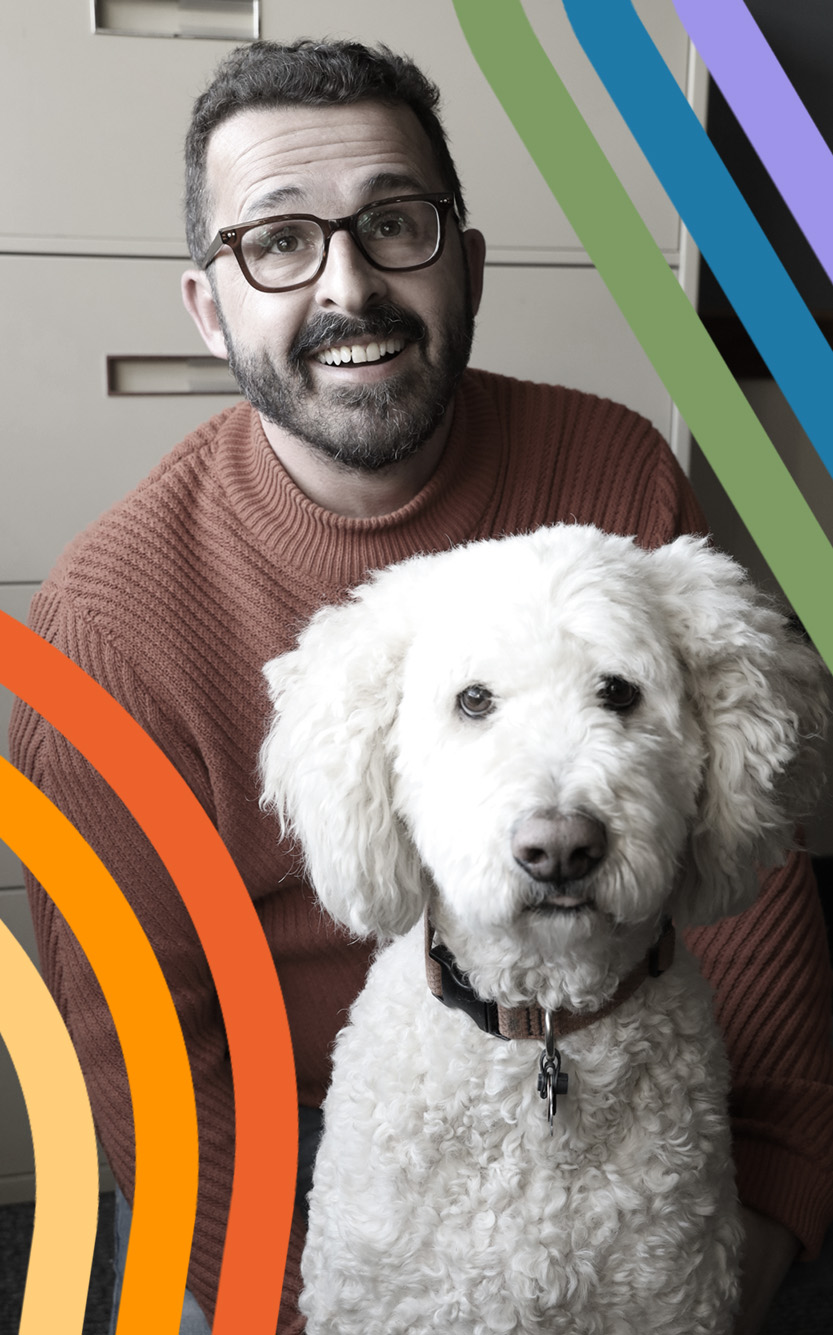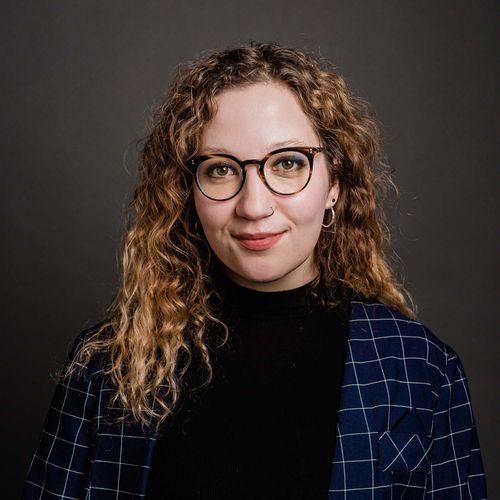My Coming Out Story: Luis Menéndez-Antuña
STH assistant professor on creating space for exploring identity and religion

Luis Menéndez-Antuña, a School of Theology assistant professor of New Testament, (and Finn). Photo courtesy of Menéndez-Antuña
My Coming Out Story: Luis Menéndez-Antuña
STH assistant professor on creating space for exploring identity and religion
June is Pride Month. To celebrate, BU Today is reprising our My Coming Out Story series, where members of the Boston University community share their stories about coming out and self-acceptance.
We’ll bring you a new narrative each week throughout the month.
First up: Luis Menéndez-Antuña, a School of Theology assistant professor of New Testament, a practicing Catholic, a former Fulbright scholar, and a longtime activist who identifies as queer. Menéndez-Antuña teaches courses on Greek, the New Testament, queer theory in religious texts, and more.
Here’s his story.

“Very traumatizing, but also very liberating”
I’m not a big fan of the coming-out narrative. It assumes that you’re hiding somewhere, and then there’s a moment of enlightenment where you realize who you truly are and decide to share it with the world. I’m not saying that that’s not a good narrative. I think it works for some people. But I don’t think it works for everyone.
So for me, there’s not a coming-out narrative that I endorse for my own personal life. That doesn’t mean that I haven’t had to share my sexual preferences with the world at certain points. (The first time I said, “I’m gay,” to somebody was to a very close friend when I was 21.) I’m actually very open about it; I love talking about sex and sexuality. I’m very open professionally, personally, spiritually…you name it.
I always knew that I was attracted to the same sex. I think there was some trauma [from my upbringing] just because I grew up in a very rural background and never had any reference of what a gay man could look like. I was born in Spain, the same year that the country’s dictator, Francisco Franco, died. So I was born into democracy, if you will. It was still very traditional, very Catholic, and very conservative, in the worst possible ways. But then Spain was one of the first countries in the world to pass gay marriage. So you see the contradictions, right?
I do remember very distinctly when Freddie Mercury died. I was in my mid-teens, and he was the first cultural reference of a gay or bisexual male I’d seen. So to me, the link between being gay and dying of HIV was there from the very beginning. I mean, I really thought I was going to die of HIV. I’d never even touched anyone! I’ve since shared that experience with some of my friends, and we kind of all went through the same thing, maybe not with Freddie Mercury, but with other well-known figures.
I think my big disadvantage has also been my great advantage. I grew up in a very Catholic environment, but it wasn’t too crazy. (And this is my experience—I don’t want to say that it’s everybody’s.) Some religious traditions think of sexuality as something completely evil and impure. That emphasis on sex as something evil was never imprinted on me; we don’t have purity culture in Spain. And I went to Catholic school my entire life! For me, Catholicism has provided me with a good grounding in values, a good sense of who I am, and clear goals in life. That helped me a lot in dealing with my queerness, despite the initial trauma that I experienced with the HIV crisis.
That’s something I also try to bring to my classes. I teach a lot of students who come very traumatized by the church and by all kinds of conservative backgrounds. But religion can be both very traumatizing, but also very liberating, and a great way of exploring queer identity in ways that are very emancipatory and life-giving. That’s what we’re trying to do here at the School of Theology.
For example, I teach a course on queer theory and the New Testament. Queer theory helps us to defamiliarize what we know about the Bible. It’s a document, right? Or rather, a group of documents, that many traditions consider as authoritative and inform the way that many of us—myself included—try to understand the world. But it’s also a work of literature. And as a work of literature, it can be interpreted from many different perspectives, just like Aristotle or Shakespeare. One of those perspectives can be queer theory.
I like to think of it as: first, there has to be a deconstruction mode, and then a construction mode. Why? Many people approach contemporary issues with a lot of misconceptions about what the Bible says. A lot of misconceptions. Let me just give you one example. Think about the cultural discourse around the “biblical view of marriage.” If you came into my class right now, I couldn’t tell you what a biblical view of marriage is because there is no one view of marriage to start with. In the Hebrew Bible, you have polygamy. There are different versions of what marriage is in the New Testament. But for the most part, it’s pretty against marriage, period. Think about it: Jesus was single. In several versions of the Gospels, he asked disciples to abandon their wives. Paul actually recommends to the communities to not get married. So I’m not saying that the New Testament is queer. But what I am saying is that it’s not this straight, heterosexual text that you may have been made to believe.
I got into theology for different reasons. I felt like it was the natural path for me [with my religious background and an undergraduate degree in philosophy]. Also because after three years teaching both philosophy and religion in a high school, I realized I wasn’t being intellectually challenged. And the second thing that happened was the economic downturn in 2008. I was like, okay, this is an opportunity to change careers. I wanted to do a PhD in something that I could contribute to intellectually, not only for the sake of ideas, but for real-world application. So I thought: What is the most homophobic field in the humanities? The Bible? All right, let’s do it.
For me, the thought process was like, okay, this is the most homophobic field, for obvious reasons. But, it’s a field in which I can make a real contribution, because if I’m successful, I’m gonna be teaching pastors, I’m gonna be teaching activists, I’m gonna be teaching people who are going to be impacted in the real world. Queer theory is also just a small part of what I do. I also have a background as an activist—I worked for many years in jails, and I lived in a homeless shelter for many years, too. In general, I’m very interested in how issues or contemporary problems inform readings of the Scriptures, and vice versa. So I also teach colonial theory; I’m going to be teaching a course on enslavement, just because I’m very concerned about how churches are talking about reparations. I always try to make a contribution whenever I can, in debates around contemporary topics.
I would agree that one of my life’s journeys has been making space for myself within what I know. But, I never make it about myself. It’s never about myself. It’s about traditions. It’s about finding resources to build communities. It’s about the world we want to build together.
This Series
Also in
My Coming Out Story
-
June 28, 2022
My Coming Out Story: Vincent Stephens
-
June 22, 2022
My Coming Out Story: David Chard
-
June 15, 2022
My Coming Out Story: Chantel James


Comments & Discussion
Boston University moderates comments to facilitate an informed, substantive, civil conversation. Abusive, profane, self-promotional, misleading, incoherent or off-topic comments will be rejected. Moderators are staffed during regular business hours (EST) and can only accept comments written in English. Statistics or facts must include a citation or a link to the citation.